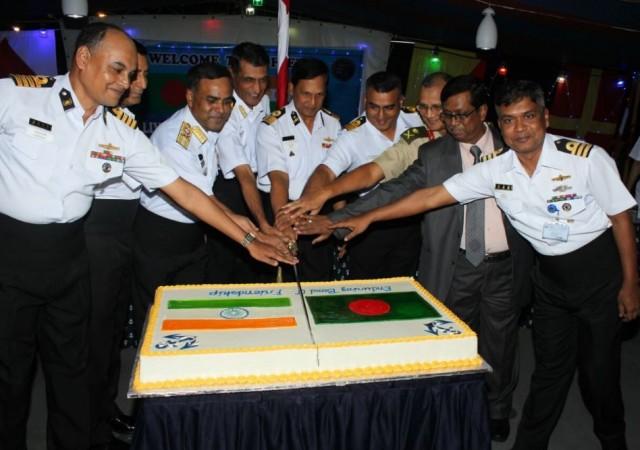
In view of China deepening its strategic hold on Bangladesh, India does not want to be a mere spectator. New Delhi is fast looking to upgrade its defence cooperation with Dhaka, even as Chinese handed over two submarines to the Bangladesh Navy.
New Delhi is working on a new defence cooperation framework with Dhaka, and is sending its defence minister, Manohar Parrikar on a two-day visit on November 30, government sources told the Times of India.
New defence cooperation framework between the two countries will lead to increase in military supplies, transfer of technology, training and joint exercises and cooperation in counter-terrorism.
Parrikar will become the first defence minister to visit the country in several years. The defence cooperation framework is likely to be signed during the December visit of Bangladesh PM Sheikh Hasina.
This is in the backdrop of Bangladesh Navy accepting two refurbished Type 035 (Ming)-class diesel-electric submarines (SSKs) from China on Monday. The boats were previously in service with People's Liberation Army Navy (PLAN) and were part of the BTD16 billion (USD203 million) contract for the two vessels, named Nabajatra and Joyjatra, IHS Jane's Defence Weekly reported.
The submarine features eight 533 mm tubes that can carry heavyweight torpedo and 32 naval mines instead of torpedoes. The vessels are expected to arrive in Bangladesh either in January or February 2017. Bangladesh is also reported to be constructing submarine base near Kutubdia Island, the report noted.
It is difficult for a country like India to match the Chinese in terms of their investments in Bangladesh (Xi Jinping in October 2016 signed deals worth $25billion) or its defence offerings (China has a stronger domestic defence industrial base than India).
India can get smarter and supply the Bangladeshis with naval offshore patrol vessels (OPVs), which have proven their mettle, and India is supplying it to other countries too. India can also increase the training of Bangladeshi personnel in Indian military establishment.
Currently, Indian Army is conducting joint military exercise with the Bangladeshi Army called, Sampriti 2016. This is the sixth such exercise being conducted between both the countries. Since 2009, India is having direct Army-to-Army staff talks with Bangladesh. India holds such talks with only a few countries and this makes Bangladesh a closer partner in the security of South Asia.
#Indian & #BangladeshArmy, troops rehearse Special Operations for Hostage Release and Rescue #ExSampriti2016. pic.twitter.com/AYWAhhZD1V
— ADG PI - INDIAN ARMY (@adgpi) November 14, 2016
Indian & Bangladesh Army troops preparing for impending operations during Exercise #Sampriti2016 pic.twitter.com/Gl1T5XT1Yn
— ADG PI - INDIAN ARMY (@adgpi) November 13, 2016
The source suggested that the two countries are likely to conduct regular naval and air force exercises in the future.
#BridgesofFriendship @SpokespersonMoD @hcidhaka Senior Officers Bangladesh Navy visit 1st Training Squadron & being briefed by Capt DJ Revar pic.twitter.com/EZq25eOd1S
— SpokespersonNavy (@indiannavy) November 15, 2016
The current government of PM Hasina has been supportive of India and had backed Indian move to withdraw from the SAARC summit in Islamabad following the Uri attack. The two countries cooperate on several counter-terror related cases. India and Bangladesh resolved the problem of enclave in each other's territory with the Land Boundary Agreement that was adopted when Indian Parliament passed 100th Amendment to the Indian Constitution in May 2015.
Bangladesh in early 2016 scrapped a Chinese bid to construct Sonadia deep-sea port at Cox's Bazaar, which relieved India. But Bangladesh supports the Chinese "One Belt, One Road" initiative.
The only way ahead for India is to enhance and step up its engagement with its eastern neighbour.

















